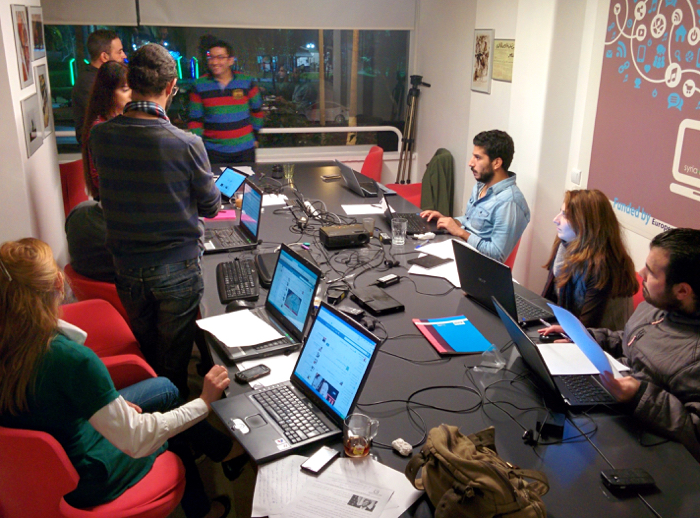
Modern news sites act as converged content factories, delivering information across all user devices through a streamlined, multi-platform digital newsroom.
This article was written for online journalists working in a recently converged newsroom.
Consistency across all devices
If the editor-in-chief of your news organisation is out of the country, she or he should be able to browse your site, and by looking at your story choice and treatment have a good idea about the news priorities of the entire news organisation.
Your website will probably share the same news schedule as your broadcast or print colleagues. You may share reporters and correspondents. Some have a combined planning team.
When stories are discussed for TV, radio or print, someone from the online team needs to be present. They need to sit in on news meetings and suggest interactive elements for all the big stories.
Their role is to come up with ideas for presenting information in ways that can engage the audience.
The duty editor needs to ensure that the material that appears on the site cross-promotes other output areas.
If the website is part of a broadcasting organisation with TV and radio news output, it will be expected to display the best of the material produced by the broadcasters.
The news website should include details of when that item can next be seen on TV or radio.
This is particularly true where your news operation has uncovered valuable, exclusive information and has a special programme, or a special report, running on TV or radio.
The cross-promotion can be shown as a text link signifying when the next opportunity for watching or listening to the news item is scheduled, or it can be a box offering some or all of the material from the TV and radio output.
For news websites offering video and audio on-demand, cross-promotion is essential.
Managing all these resources so that they enhance the news website and the stories that appear on it, is one of the main functions of the online duty editor.
It is also important that the audience finds the same facts online as they hear or see on air or read in print. They must not be given mixed messages.
Liaising with other departments
It is important that the duty editor has a system for letting other departments know which stories the online team is investing time and resources covering. This usually begins with the daily news meetings.
The chances for cross-promotion on air, on screen, and in print, will be far greater if the person in charge of the editorial content on the website lets the editors of other news outlets know what the online team is creating.
Some news operations have a shared online folder where the various elements of a story are added so that all are aware of what is being created and what is available.
Some have a superdesk system where representatives of all outlets sit together and share knowledge.
Whatever the system, the duty editor in charge of the news website should tap into this resource regularly.
TV and radio producers will need to know when an interactive element is likely to be ready so that they can promote it in their programmes.
They will want to know when the interactive team is in place to take feedback from users online.
They will need to know when a guest is being lined up for an online interview.
All these elements need to be brought together by the duty editor and offered to all outlets in good time for them to include a mention in their output.
It is pointless for a news website to organise a talking point on an issue if the duty editor hasn’t told his or her counterparts about it.
As you inform these outlets, be ready to consider their suggestions. The other editors might have excellent ideas about what should be created online. Keep an open mind. Be prepared to try new ideas if they will enhance the output.
News agenda
The duty editor of a news website must check every decision to ensure that it is in the best interest of the news brand and its users.
Examining motives is essential. There have been hand-over meetings where the incoming duty editor has decided to change the front page completely.
This is justified if the previous front page was an inadequate reflection of the news, but it is not justified if it is to try to make the incoming duty editor look good.
There have been stories that have taken hours to create, removed from the front page after appearing there for less than an hour. It may be, however, that there is so much breaking news that there is no room for everything.
The news agenda must:
- include all the main stories being covered by the rest of the news operation.
- exploit all resources and effort being committed to covering the news.
- reflect the strengths of your organisation’s newsgathering effort.
The news agenda is not:
- the chance for the in-coming duty editor to look good.
- an opportunity to play with news to appear clever.
- an excuse to deploy inappropriate interactive elements.
- a news product isolated from the rest of the news operation.
The duty editor of a news website has an enormous responsibility. She or he needs to be clear about why news items appear, and why changes are made.








